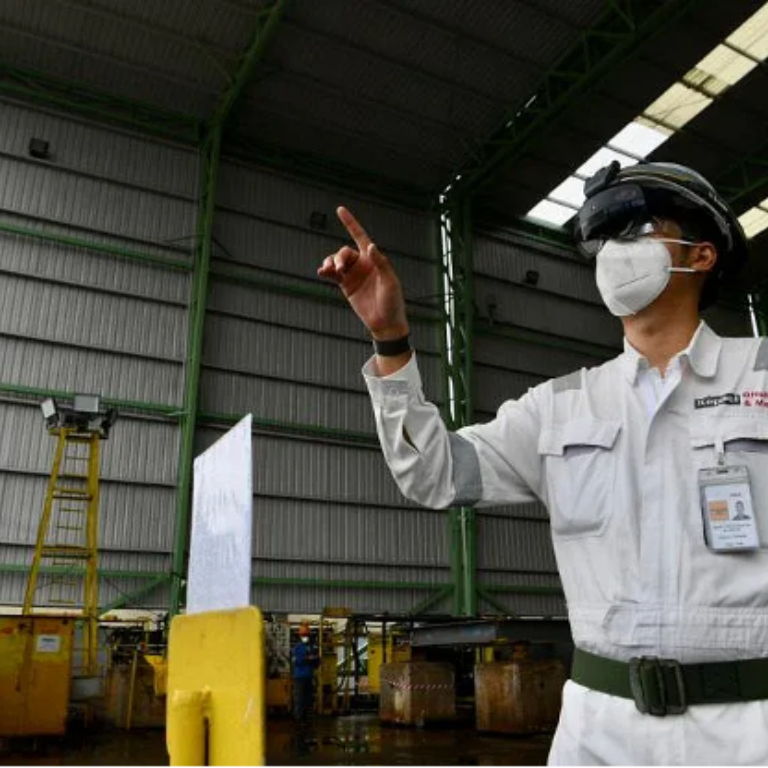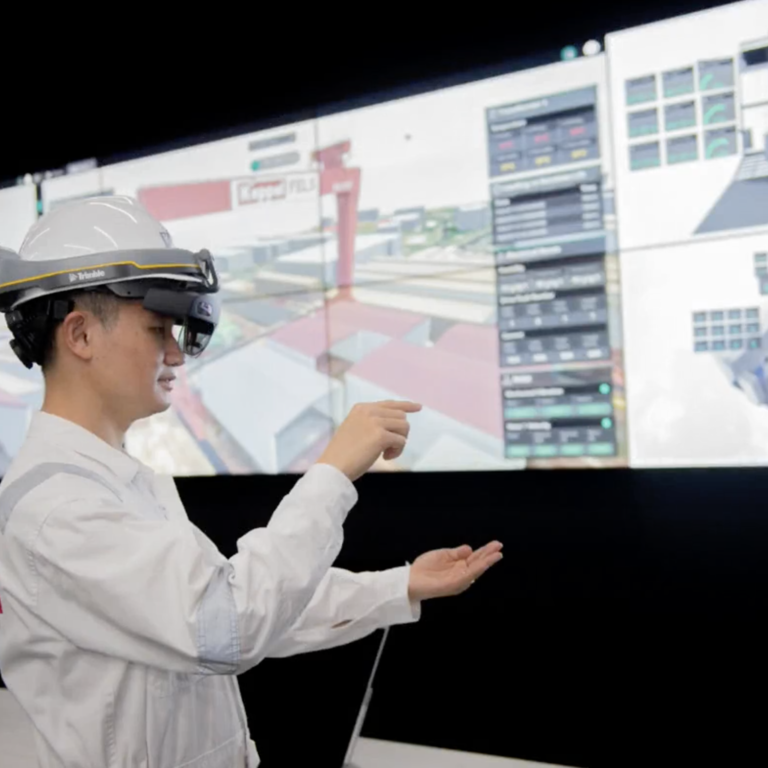5G Transformation Hub
How 5G is enabling smart eyewear for the maritime industry
5G-smart glasses are helping Keppel overcome challenges both old and new
Keppel Offshore & Marine Ltd (Keppel O&M), in partnership with Singapore mobile network operator, M1, Keppel Digi and homegrown start-up Hiverlab, has implemented a 5G augmented and virtual reality (AR/VR) smart eyewear solution at its yard in Singapore - the first in Southeast Asia’s maritime industry. This pilot project is part of Keppel O&M’s strategy to use digitalisation and virtual technology to enhance the efficiency of remote inspections and other operations for its tech-enabled workforce.
Select a project
Contents
Challenge
Following the norm of lockdowns and travel restrictions around the world, Keppel and M1 have sought the ways to use smart glass to ensure business runs smoothly for Keppel, its partners, clients and its customers.
Solution
M1 deployed a 5G standalone network at Keppel’s yards to support the deployment of smart glass headsets. Through these partnerships with IMDA, M1 and technology experts, Keppel overcame some remote working and other issues in the marine industry such as labour shortages and operational inefficiencies.
Impact & Statistics
Keppel are expected to reduce the QC manhours for inspection by 50% from 16000 to 8000 each year. The further project that that field engineer efficiency will increase by 40% and equipment downtime will be reduced by 10%.
Wider Implications
Following M1’s decision to undertake an ambitious multi-year project to provide ubiquitous 5G standalone (SA) offshore coverage for the southern coast of Singapore, this project could spur the application of 5G augmented and virtual reality (AR/VR) solutions for remote operations in the offshore and marine industry and beyond.
Stakeholders
Keppel O&M, M1, Keppel Digi, Hiverlab, IDMA
02
How 5G is enabling smart eyewear for the maritime industry
5G-smart glasses are helping Keppel overcome challenges both old and new
As part of Keppel O&M’s Yard of the Future initiative - which uses digitalisation and IoT to transform products, services, and operations - Keppel and its partners worked to test-bed applications for inspections via smart eyewear. By using M1’s 5G high-speed and low-latency connectivity, immersive AR/VR environments, highly detailed representations and real-time information can be relayed to users and control centres. The successful introduction of the smart glasses solution at Keppel is a useful test case that can be scaled and replicated to boost operational efficiency and safety across businesses and industries.
Keppel’s smart glass remote inspection already benefits from a 4G network, which in itself already provides significant advantages over a Wi-Fi system. There are three key areas of daily operation however which are solved by 5G connectivity alone:
Imaging quality - 5G can increase the fidelity of video streaming across the entire visual inspection process. This is a vast improvement on using only in-person inspections and can enable automatic detection of microdefects such as welding seam undercuts.
Seamless connectivity - 5G provides the ultra-fast low-latency connectivity required to ensure smooth communication between the wearer and the remote inspection witnesses. This is vital to the next step of the smart glass implementation which involves digital document management, (such as engineering 3D visualisations, models and drawings). These will be transmitted directly to the smart glass headset in real time, therefore eliminating the need to bring physical copies of drawings to the site and allow any discrepancies between the product to be inspected and the flagged immediately. Conventional connectivity often results in stuttering frames - large volumes of data streaming can only be reliably serviced by a 5G connection.
Stakeholder confidence – 5G boosts the confidence level of remote inspection adoption compared to the current industry standard, which involves the uncertainties inherent in inspection via lower-quality connectivity.

03
5G is changing the very nature of on-site inspection
Collaboration smoothed deployment and increase effectiveness
5G enables a new standard for on-site inspection and accelerates the tech-enabled workforce in maritime environment to enhance productivity, capability, quality and safety. Remote inspection has enabled Keppel to work around conventional, physical-based inspection which requires on-site personnel.
There were, however, technical challenges – which is why Keppel collaborated with the three major marine classification societies (ABS, DNV and BV) with the common goal of revolutionising remote quality inspections. This began a lengthy trial process, which involved ironing out the key issues to image and video streaming quality. Keppel’s close and ongoing partnership with the marine societies has enabled them to chart the way forward for both safety and innovation.
Through these and other partnerships with IMDA, M1 and technology experts, Keppel are developing AR-enabled digital twins which field engineers can use to receive real-time remote guidance. By overlaying sensor data onto their field of vision, they gain significant understanding of real-time critical issues and conditions during operations.
Smart glasses are also being used to conduct remote virtual walkthroughs of vessels – allowing Keppel engineers, clients, and classification societies to perform pre-construction feasibility assessments simultaneously – enabling potential engineering design issues to be identified earlier. Engineers can use smart glasses to validate that the project is being constructed to the correct specifications across different yards and locations where various vessel components are manufactured.

04
5G-enalbed eyewear delivered ROI
Across the board, smart glasses have created improvements across the ecosystem
Since implementing smart glass remote inspection in 2019, there has been a great reduction in potential risk of bacteria and virus transmission for clients participating in the various yard inspection processes. What’s more, they now have assurance that inspections are able to continue remotely using the smart glasses even when personnel are unable to attend the site.
In addition, the operations and commissioning team have benefitted from the remote expert function that’s used to assist and train the staff in real time. By conducting the inspections remotely, processes have been streamlined, and inspection time has been cut down significantly. Keppel expect to reduce the QC manhours for inspection by 50%, from 16000 manhours to 8000 each year. They further project that field engineer efficiency will increase by 40%, and equipment downtime will be reduced by 10%.
With the 5G AR/VR smart glass solution, the need for manual processing of documents is also greatly reduced, resulting in higher efficiency and less environmental waste. Engineers and onshore teams are able to communicate more seamlessly with the offshore team via virtual platforms to troubleshoot issues relating to asset health monitoring. For clients, vendors and customers, remote collaboration has enabled closer collaboration throughout different phases of each project.

05
Keppel show the value of smart eyewear for all to see
Across industry, Keppel demonstrate the value of 5G-enabled remote inspection
Keppel are the first company in Southeast Asia’s maritime industry to pilot 5G AR/VR solutions. The remote operation applications they have implemented are ideal for many other industries such as construction, engineering, oil and gas industries, and any other organisation which practices product and equipment inspection.
As industries face constraints on resources such as manpower, this 5G-enabled smart glass is a perfect opportunity to transform operations and reduce expenditure in the long run.
Inspection-as-a-service
Project gives company visions for the future
Keppel envisions an inspection-as-a-service model to emerge from this virtual platform for remote inspection, survey, audit and collaboration – this will enable them to offer value-added services to maritime customers both locally and in international waters.

06
About
About the GSMA
The GSMA is a global organisation unifying the mobile ecosystem to discover, develop and deliver innovation foundational to positive business environments and societal change. Our vision is to unlock the full power of connectivity so that people, industry, and society thrive. Representing mobile operators and organisations across the mobile ecosystem and adjacent industries, the GSMA delivers for its members across three broad pillars: Connectivity for Good, Industry Services and Solutions, and Outreach. This activity includes advancing policy, tackling today’s biggest societal challenges, underpinning the technology and interoperability that make mobile work, and providing the world’s largest platform to convene the mobile ecosystem at the MWC and M360 series of events.
For more information, please visit the GSMA corporate website at www.gsma.com.
Follow the GSMA on Twitter: @GSMA.
GSMA 5G Transformation Hub
The GSMA 5G Transformation Hub is an authoritative source of information on some of the most innovative 5G solutions in the world. This portal contains case studies detailing design, benefits, key players, measured value and the future impact of scaling up these 5G solutions worldwide. The 5G Era is now firmly established and this family of standardised GSM technologies, including mmWave, are being rolled out successfully across the globe. The GSMA 5G Transformation Hub, launched at MWC Barcelona in 2022, provides details of how 5G is best placed to deliver real value for a range of key sectors including manufacturing, energy, transportation, live entertainment, smart cities and construction. We acknowledge the kind support and sponsorship of Qualcomm Technologies with the creation of this case study.
Many more case studies will be added, in the coming months, covering even more industries and the GSMA is asking Members to nominate innovative 5G case studies to add to this global digital showcase.